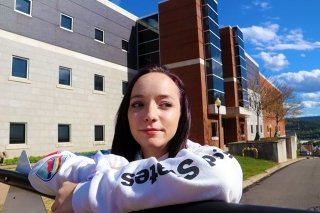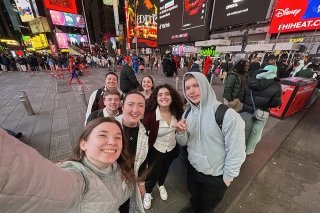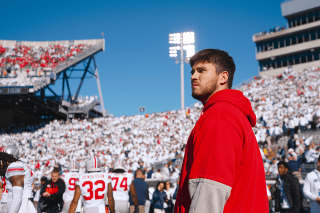Data science opening doors to real-world impact
Bloomsburg
Posted
Excited about self-driving cars and voice recognition? How about researching behavior using social media? Data science focuses on just that and more ... Sound interesting? It really is!

Juliette Gudknecht is an analytical type who likes to solve problems.
Majoring in physics was an obvious and fitting choice for her at Bloomsburg University. Then she discovered how mathematics could be used to solve real-world problems.
And her sights were set.
“I took one computer science class and fell in love with programming,” says Gudknecht, a mathematics and physics dual major who plans to pursue a master’s degree in data science and become a data scientist. “I’ve always been fascinated with science, specifically astronomy. I had the same mindset most do — that (astro) physics would be too hard to pursue, or that I was bad at math. I decided to just go for it and work hard.”
That grit and determination has led to a lengthy resume of internships, summer programs, and research opportunities to include two years of analyzing NASA telescope data. All done semesters ahead of graduating next summer.
Her latest endeavors involve interning with the U.S. Department of State working on a machine learning neural network algorithm for visa applications and assisting Authentic Social as a consultant intern, leveraging her data science skills with sales analytics and improving their social media strategies.
“I love it,” Gudknecht says. “It’s a great change of pace from previous internships and class projects. I’m getting real-world experience and fostering connections to advance my career.”
Networking and real-world impact have been Gudknecht’s calling, a common thread to her vast list of out-of-classroom experiences that have included projects with Princeton, Stanford and Old Dominion universities, and most recently her machine learning internship with the federal state department.
“Basically, I’m using mass amounts of data to train the computer to work on its own,” Gudknecht says. “This involves using information for visa applications and automating some of the processes, so we can catch things better and improve our national security. It’s a super fun internship! I’ve made many connections already (with) other universities, tech companies, and federal agencies.”
Gudknecht got an earlier taste of machine learning — a branch of data science that involves building algorithms from a math model based on sample data — this past spring helping Geisinger Medical Center during the initial wave of the COVID-19 pandemic.
“I was very happy to help out,” says Gudknecht in creating machine learning algorithms from Geisinger’s (COVID-19) data to predict the curve of cases. “It’s made me very motivated to tackle real-world problems. I also found a love for healthcare informatics. I think it’s awesome I could make a difference and save lives through data science.”
Her methodic climb through physics and math into data science can be traced back to those single steps she took in gauging her initial interest in STEM (science, technology, engineering, and mathematics) as a teen, bringing her to Bloomsburg.
“I’ve learned mathematical and computational skills that are very transferrable and in high demand on the job market,” Gudknecht says. “I recommend any STEM major who likes to solve problems to look into the data science program at BU. Job prospects look great for data science and the professors are amazing.”



